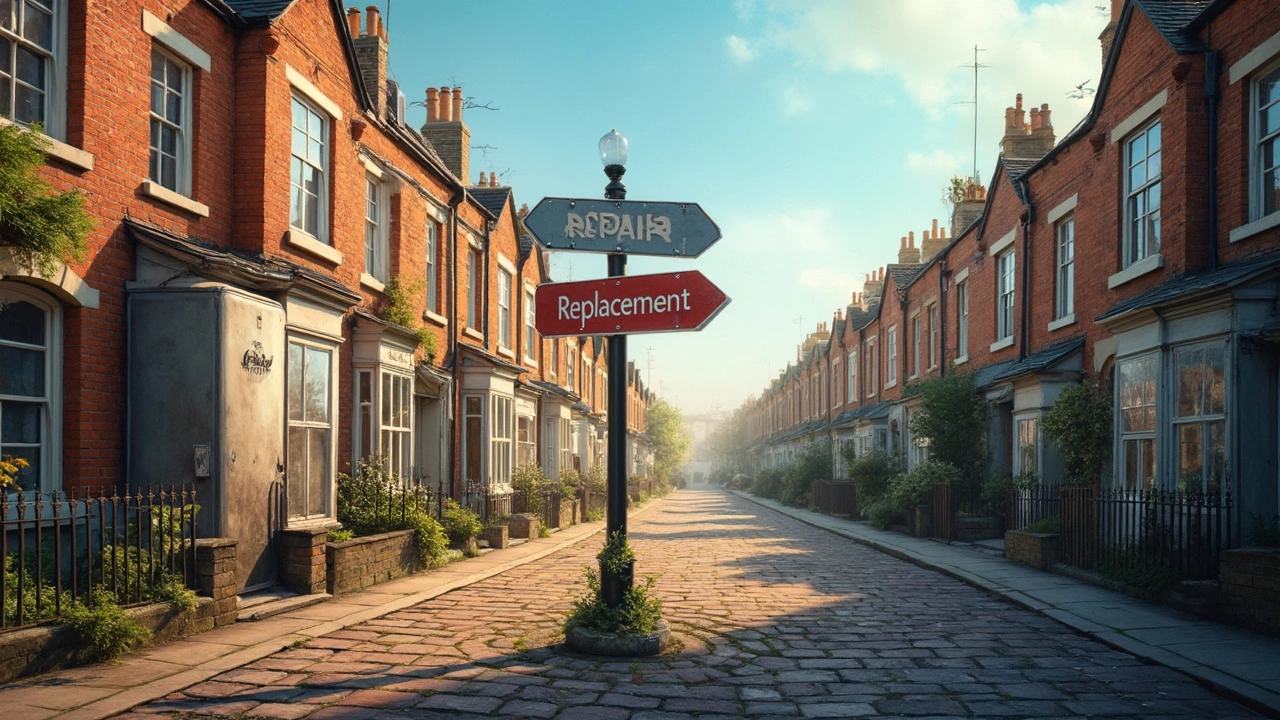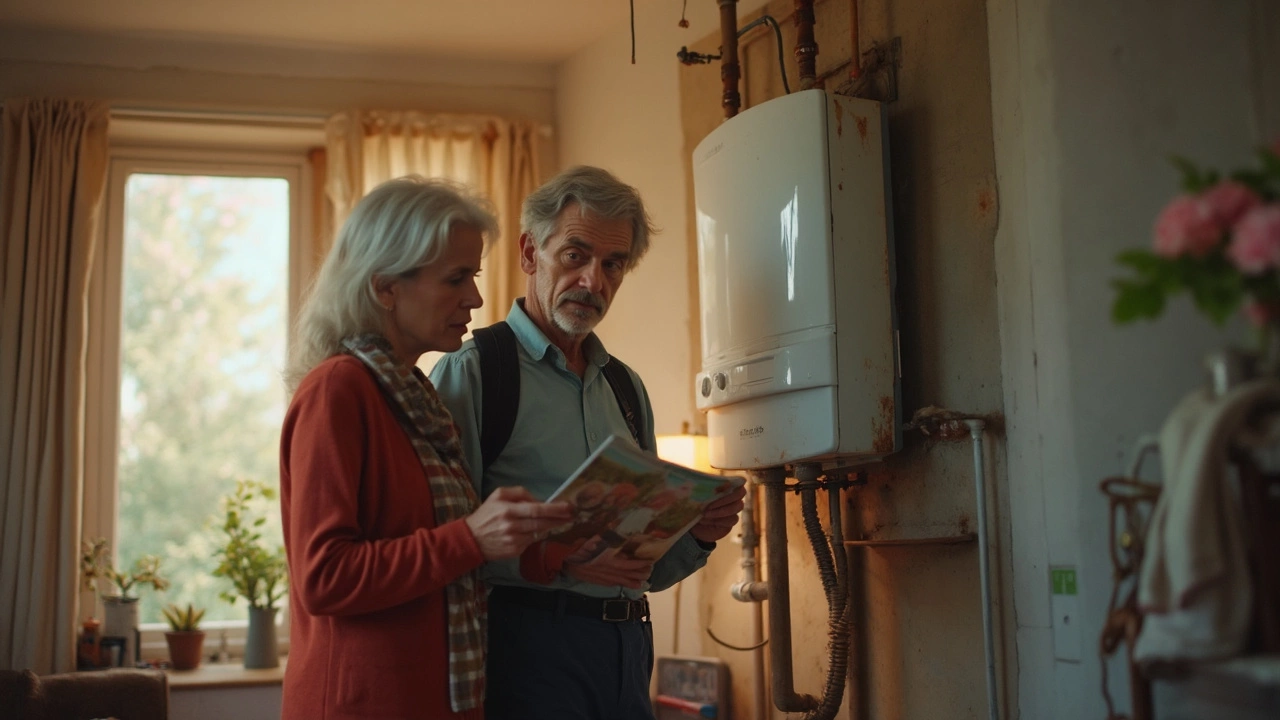Trying to figure out whether to repair a creaky, 20-year-old boiler can feel like solving a riddle. One minute they're warming the house; the next, you're jiggling pipes and crossing fingers. Boilers can have surprisingly long lifespans, but those later years might cause headaches.
First off, consider the current state of your boiler. It's like having a car: after too many miles, things just start to go wrong. Are breakdowns becoming more frequent? Listening to rattles, leaks, or unusual noises can be a sure sign it’s struggling to keep up.
Not to mention, energy efficiency. Older models often guzzle more power, driving up utility bills without you realizing. If that monthly bill's giving you a shock without added value, it might be your boiler siphoning your cash.
So what's the verdict? If you keep patching it up, costs might snowball. Weighing all these factors is crucial, and knowing when to bite the bullet and invest in a new system can save grief in the long run.
- The Current State of Your Boiler
- Energy Efficiency Concerns
- The Costs and Frequency of Repairs
- Safety Considerations
- Environmental Impact
- When Replacement is the Best Option
The Current State of Your Boiler
Before deciding whether to repair your old boiler, take a close look at its current state. This means you’ll need to get hands-on and maybe a bit dirty, but it’s worth it. First, consider the age. Most boilers typically last around 15 years if they're given the royal treatment. If yours has passed the 20-year mark, that's a sign it might be on borrowed time.
Start with checking for leaks. A boiler leaking water or gas can be a big red flag. Constant leakage might suggest the tank's corroding from the inside, which isn’t something a quick patch-up can fix.
Also, listen out for unusual noises. Are there new clangs, bangs, or hissing sounds? These are SOS signals from your boiler that it's not working efficiently.
Assessing Performance
Next, consider your boiler's performance. Is it taking longer to heat your home? Uneven heating across your house can suggest that the system isn’t distributing heat properly. This often translates into discomfort and, naturally, complaints from family members competing for blankets.
Boiler Energy Usage
Take a peek at your energy bills over the last few months. If they've crept up without an obvious reason, your aging boiler's efficiency might be slipping. Not only does this hurt your wallet, but it's not doing the planet any favors either.
Maintenance History
Finally, dig out the maintenance records. Have you been calling repair services more often than catching up with friends? If your service technician is on speed dial, the repair costs are likely adding up. Maybe it’s time to weigh those frequent fixes against the price of a new system.
Energy Efficiency Concerns
When it comes to old boilers, energy efficiency isn't just a buzzword—it's your wallet crying out for help! Twenty years ago, your trusty boiler might have been top of the line, but technology has come a long way since then.
Boilers from a couple of decades back typically have an efficiency rating hovering around 60-70%. Compare that to modern high-efficiency boilers, which boast ratings from 90% upwards, and it’s clear how much energy is going to waste—translating directly into higher bills.
How to Measure Efficiency
Check the Annual Fuel Utilization Efficiency (AFUE) rating. Your boiler should have this somewhere on its label. It tells you how much heat the boiler produces compared to the fuel it consumes. A higher AFUE means better efficiency.
Spotting Inefficiency
- Are energy bills creeping up month after month, even without cranking up the heat?
- Notice cold spots in your home that just won’t warm up?
- Does the boiler cycle on and off frequently?
If all this sounds familiar, your old boiler is probably wasting a serious amount of energy.
Long-term Costs
Paying a bit more upfront for a highly efficient boiler could save loads of cash down the road. Plus, many countries offer rebates or incentives for upgrading to greener appliances. Consider the long game here: an upgrade reduces energy waste, cuts down on bills, and boosts comfort at home. It's worth thinking about!
For a quick look at how costs can add up, here's a basic comparison:
| Boiler Age | Efficiency | Annual Cost |
|---|---|---|
| 20 years old | 65% | $1,200 |
| New Model | 95% | $800 |
This table is a hypothetical illustration, but the idea is solid: newer, more efficient boilers can lead to significant savings. Don't underestimate how that saved money adds up over time!
The Costs and Frequency of Repairs
When it comes to boiler repair, knowing how much you're spending and how often these costs crop up is crucial. Nobody likes throwing money into what's essentially a bottomless pit, especially on something as unexciting as an old boiler.
First things first, how frequent are your repair bills popping up? If it feels like you're calling the repair guy every season change, that trend might not be sustainable. Old boilers can become real pains as wear and tear set in, leading to frequent breakdowns.
Typical Repair vs. Replacement Costs
A typical repair might set you back anywhere from $200 to $600, depending on the problem and boiler lifespan. This can escalate quickly if it's a critical component that fails, like the heat exchanger or controls system.
Let's look at a quick comparison with replacement costs:
| Repair Type | Estimated Cost (USD) |
|---|---|
| Basic Tune-Up | $100 - $200 |
| Major Part Replacement | $300 - $800 |
| New Modern Boiler | $3,000 - $5,000 |
As you can see, while smaller repairs might seem reasonable, bigger repairs cling closely to the low end of a full replacement price.
Cost-Benefit Analysis
It's essential to weigh these costs against the lifespan of a boiler. A 20-year-old boiler, even with solid repairs, may not last a few more years without incidents. When those repair costs start nipping at the heels of fully replacing the unit, it's time to think long-term savings.
Finding yourself revisiting identical issues could be a red flag that parts are wearing out evenly. Meaning, another breakdown could be lurking around the next corner, bringing yet another invoice with it.
At a certain point, it's advisable to consider energy-saving models that could lower bills and reduce carbon footprints. These might be higher initial investments but could end up being easier on the wallet as electricity and gas costs continue to climb.

Safety Considerations
When it comes to boilers, safety should never be an afterthought. A 20-year-old boiler might seem like a trusty old friend, but it has potential risks that should be taken seriously. Awareness and regular checks can prevent some nasty surprises.
One major concern is the risk of carbon monoxide, an odorless and colorless gas that can be deadly. Older boilers may lack modern safety features that help detect or prevent leaks. So, installing a carbon monoxide detector near your boiler is a wise precaution.
Another point to ponder is the build-up of rust and corrosion inside the boiler system. This might not sound dangerous, but deteriorated parts can lead to leaks or even more serious failures. Not what you want happening when you're lounging in your pajamas!
Common Safety Risks
- Gas leaks: Always a risk with older boilers, ensure regular inspections by a licensed professional.
- Pressure problems: If your boiler is losing pressure quickly, it's a hint something's amiss.
- Scalding risk: Older boilers without anti-scald technology can cause hazardous hot water temperatures.
Getting your boiler serviced annually can help nip many safety risks in the bud. A professional can catch potential pitfalls early on, saving you the hassle and ensuring your home remains a safe haven.
Ultimately, keep in mind that knowing when to say goodbye to an old boiler isn't just about avoiding inconvenience—it's about prioritizing your family's safety and peace of mind.
Environmental Impact
Let's talk about the planet, because keeping an old boiler kicking around isn't just a personal balance sheet issue. These old workhorses tend to be less kind to the environment. Most boilers from two decades ago weren't exactly designed with Mother Earth in mind.
Older boilers typically have lower efficiency ratings. And you know what that means? You're burning more fuel to achieve the same warmth. This not only shrinks your wallet but also increases carbon emissions. With growing awareness about climate change, thinking about how much your boiler's footprint affects the environment is pretty important. You don't want to be cranking out more emissions than Meghan's diesel truck next door, right?
Switching to a modern boiler design can cut your energy consumption by a quarter or even more. That's not just a win for the heating bill but a pat on the back for the planet, too.
Recycling and Waste
What happens when your old boiler finally gives up? A lot of old boilers end up in landfills if not properly recycled. New boilers, however, often come from eco-friendly designs with recyclable parts. Some companies even recycle your old unit for you when they come to install the new one.
Data Speaks
Not convinced? According to a 2021 energy report, homes using updated, high-efficiency boilers saw a reduction of CO2 emissions by an average of 1.5 tons per year compared to older models. That's a substantial drop when you consider emissions on a broader scale.
| Boiler Age | CO2 Emissions Per Year |
|---|---|
| 0-5 Years | 3.6 tons |
| 15-20 Years | 5.1 tons |
Bottom line, if you're thinking about the bigger picture and your carbon footprint, hanging onto an old boiler might be doing more harm than good. Sometimes, saying goodbye to the old and hello to the new is both more efficient and environmentally friendly.
When Replacement is the Best Option
Let's face it, sometimes an old boiler just doesn't cut it anymore. Knowing when to say goodbye and invest in something new isn't always easy, but there are signs to look for to avoid throwing good money after bad.
Skyrocketing Repair Costs
If the cost of boiler repair starts resembling a phone number instead of a reasonable sum, it's time to rethink. When repairs get so frequent, you feel like you're on a first-name basis with your repairman, it's probably cheaper to upgrade.
Decreased Energy Efficiency
Technology moves fast, and your two-decade-old unit is no match for modern, energy-efficient systems. You could end up saving a significant chunk on utility bills with a new boiler. Look for those with high efficiency ratings; they recoup their costs quicker than you might think.
Check out this comparison:
| Boiler Age | Efficiency Rating | Annual Operating Cost |
|---|---|---|
| 20 Years | 60-70% | $800+ |
| Newer Model | 90%+ | $500 |
Safety First
Older units might come with increased risks, like leaks or even carbon monoxide exposure. It's not worth gambling with your family's safety for the sake of avoiding the cost of a new unit.
Frequent Cold Spots
Are there rooms in your home that never quite warm up? This might be your old boiler struggling to distribute heat evenly. Newer models have better heating control, making sure every corner of your pad is comfortable.
Valuing Peace of Mind
At the end of the day, knowing you have a reliable, efficient system can be priceless. Less stress, fewer 'no-heat' emergencies, and a generally warmer home can make saying goodbye to that old clunker a no-brainer.


